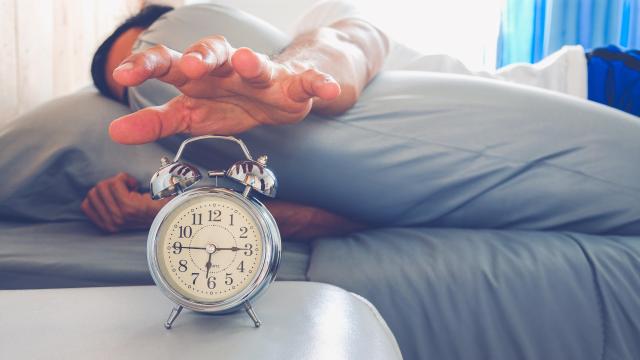Hitting the snooze button on your wake-up alarm might just be fine, new research out this week suggests. In a pair of studies, scientists found evidence that a majority of people regularly hit snooze and that the habit doesn’t seem to noticeably harm our sleep. It could even help make some people more alert in the morning.
The research was conducted by scientists from Sweden and Australia, led by Tina Sundelin, a psychologist and sleep researcher at Stockholm University. Sundelin has at times been an avid snoozer. And like many people, she had long heard about the supposed negative health effects of snoozing. But when Sundelin looked deeper, she couldn’t find any real data to back this claim up.
“As a sleep researcher, I tried to find the evidence behind this and couldn’t find a single study,” she told Gizmodo in an email.
To better understand snoozing, she and her colleagues decided to conduct two studies. In the first, they polled over 1,700 people online about their sleep habits. 69% of respondents reported using the snooze button on their alarm or setting multiple alarms at least some of the time. Snoozers were generally younger than nonsnoozers and more likely to be night owls. They also reported sleeping slightly less on weekdays (about 13 minutes less) and having more morning drowsiness. But importantly, there was no significant difference in the average quality of sleep reported by both groups.
“The most common reason for snoozing is feeling too tired to wake up, but many also snooze because it feels good,” Sundelin noted.
In the second study, the team recruited 31 self-identified habitual snoozers to be closely monitored at a sleep lab for three non-consecutive nights. Following the first night of regular sleep, each participant slept one night being allowed to snooze and the other not being able to snooze. The following day, the volunteers took simple cognitive tests in the morning and afternoon.
The researchers found no significant difference in people’s stress hormone levels, morning sleepiness, mood, and overall sleep structure whether they snoozed or not. People did lose about six minutes of sleep when they snoozed, but they also were less likely to wake up from deep sleep, which can worsen our sleep inertia—the temporary grogginess we feel when we wake up. And people on average even performed slightly better on several cognitive tests in the morning when they snoozed, suggesting that it made them more alert.
The team’s work, published Wednesday in Journal of Sleep Research, is some of the first to examine the effects of snoozing. But their findings do generally line up with another study published last year, which found that snoozers did not sleep significantly less nor feel sleepier on average than nonsnoozers. So at the very least, it appears that snoozing isn’t harming people who regularly engage in it. And it might even be an adaptive behaviour for people who like to sleep later at night or need more time in the morning to lessen their sleep inertia, the authors theorize.
“I wouldn’t recommend those who don’t snooze to start snoozing, but for those who find snoozing helpful (or luxurious) there is no reason to stop, as long as it’s not excessive and as long as you are getting the amount of sleep you need (and maybe as long as you’re not disrupting the sleep of those around you!),” said Sundelin.
Future studies on snoozing should ideally look at larger sample sizes or try to track the long-term effects of snoozing, she added. She and her team are already researching other ways that people’s sleep can be disturbed and how it can affect their waking behaviour. They’re currently studying the effects of sleep inertia in doctors who sleep while on call.
